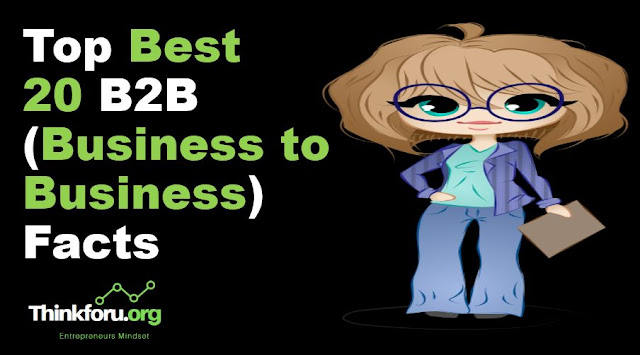Top Best 20 B2B (Business to Business) Facts
Top Best 20 B2B (Business to Business) Facts
 |
| Cover Image of Top Best 20 B2B (Business to Business) Facts |
Top Best 20 B2B (Business to Business) Facts, B2B (Business to Business) Facts, facts, Top Best 20 B2B, top 10 interesting facts about B2B facts, top 5 interesting facts about B2B facts, what are some interesting things about B2B facts...
1. B2B, or business-to-business, refers to transactions between businesses, rather than between a business and a consumer.
2. B2B transactions make up a large portion of the global economy, with many industries relying on B2B sales for their growth and success.
3. B2B sales cycles are often longer and more complex than B2C sales, as they involve multiple decision-makers and require a deeper understanding of the products and services being offered.
4. B2B companies typically offer a more specialized and niche product or service compared to B2C companies.
5. B2B companies often rely on building long-term relationships with their customers, rather than one-off transactions.
6. B2B marketing efforts are often focused on building trust and establishing expertise, rather than solely promoting the product or service.
7. B2B companies may offer more customization and flexibility in their products and services to meet the specific needs of their customers.
8. B2B sales often involve higher value transactions compared to B2C sales, making the stakes higher for both the buyer and the seller.
9. B2B companies often have more complex supply chains and distribution networks compared to B2C companies.
10. B2B sales and marketing teams often require a different set of skills and expertise compared to B2C, including technical knowledge and industry-specific understanding.
11. B2B companies may have a more limited target audience, but that target audience may be more valuable due to their willingness to make larger purchases and their potential for repeat business.
12. B2B companies may face increased competition from both established players and new entrants in the market.
13. B2B companies may face unique regulatory and legal requirements compared to B2C companies.
14. B2B companies often rely on data and analytics to inform their decision-making, including pricing, product development, and marketing strategies.
15. B2B companies may have different buying behaviors compared to B2C, with a greater emphasis on research, comparison, and negotiation.
16. B2B companies may have a greater need for account management and customer service, as they build and maintain long-term relationships with their customers.
17. B2B companies may use different channels for marketing and sales, including trade shows, industry events, and direct sales.
18. B2B companies may face unique challenges in building and maintaining their brand and reputation, as their target audience may be more focused on the quality and reliability of their products and services.
19. B2B companies may face challenges in adapting to new technologies and trends in the marketplace, including digital transformation and the increasing use of e-commerce.
20. B2B companies may have opportunities to diversify their product and service offerings, expand into new markets, and leverage their existing relationships and expertise to drive growth.
Top 20 Facts about IPL
Top 20 Facts about Holi
Top 20 Facts about Social Media Advertisement
Top 20 Facts about Life TV Show
Top 20 Facts about YouTube Marketing
Top 20 Facts about Neuromarketing
Top 20 Facts about Sales and Marketing
Top 20 Facts about Digital Marketing
Top 20 Facts about YouTube Shorts
Top 20 Facts about Mobile Marketing
Top 20 Facts about Online Advertising
Top 20 Facts about Facebook Advertising
Top 20 Facts about Internet Marketing
Top 20 Facts about Search Engine Marketing
Top 20 Facts about B2B
Top 20 Facts about Twitter X Marketing
Top 20 Facts about Consumer Behaviour
Top 20 Facts about Small Business Marketing
Top 20 Facts about Entrepreneurship
Top 20 Facts about LinkedIn Marketing
Top 20 Facts about Inbound Marketing
Top 20 Facts about Content Marketing
Top 20 Facts about Email Marketing
Top 20 Facts about Women Entrepreneurs
Top 20 Facts about Being an Entrepreneur
Top 20 Facts about Franchises
Country Facts
Top 20 Facts about Ancient Egypt
Top 20 Facts about the United States
Top 20 Facts about China
Top 20 Facts about the United Kingdom
Top 20 Facts about Japan
Top 20 Facts about Canada
Top 20 Facts about Denmark
Top 20 Facts about Hungary
Top 20 Facts about Estonia
Top 20 Facts about Ireland
Top 20 Facts about Lithuania
Top 20 Facts about Italy
Top 20 Facts about Sweden
Top 20 Facts about Spain
Top 20 Facts about Zimbabwe
Top 20 Facts about Afghanistan
Top 20 Facts about Greece
Top 20 Facts about Russia
Top 20 Facts about Norway
Top 20 Facts about South Africa
Top 20 Facts about Ethiopia
Top 20 Facts about Portugal
Top 20 Facts about Czechia
Top 20 Facts about Peru